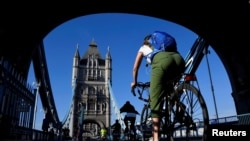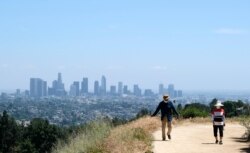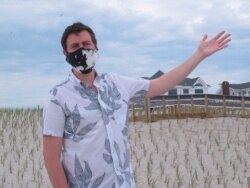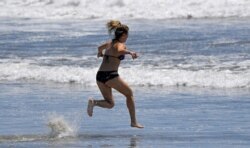Maybe it's the warmer weather. Maybe it's cabin fever.
But across the United States, the number of people leaving their homes and venturing out against quarantine orders has increased dramatically in the past few weeks.
The number of infections and deaths is bound to go up again. But experts recognize that it's hard to expect people to stay under lockdown.
"It's a very difficult situation," Andrew Janowski, a pediatric infectious-diseases physician at Washington University School of Medicine, said. "People are certainly wanting to get back out there" after weeks under stay-at-home orders.
"There's got to be a balance and there isn't a right answer at this point," he added.
But with Northern Hemisphere spring in full swing, Janowski said, outdoor activities are not off limits.
"There's still ways you can get outside your home and really try to reduce your risk of becoming infected with this virus," he said.
Open air
When it comes to public places, you're better off outside.
The coronavirus that causes COVID-19 "definitely spreads more indoors than outdoors," Roger Shapiro, Harvard University associate professor of immunology and infectious diseases, said.
A study involving 1,245 confirmed cases in 120 cities in China found only two infections happened outdoors.
The virus spreads mainly through droplets people produce when they cough, sneeze, sing or even speak. Most are large enough that they don't travel very far — hence the recommendation to keep at least 2 meters from other people.
Scientists are still studying the role that airborne droplets play in spreading the disease. But whatever their contribution, outdoor breezes keep them from lingering anywhere for very long.
"The virus droplets disperse so rapidly in the wind that they become a nonfactor," Shapiro said.
Wearing a mask will help cut down on the number of droplets a person produces, and experts say everyone should be wearing them, even outside.
But don't worry about that jogger who ran past you without one.
"While you should still try to maintain that [2-meter] distance, someone passing you on a sidewalk or trail outdoors would have little chance of transmitting virus to you during such a brief exposure," Dean Winslow, Stanford Health Care infectious-diseases physician, said.
The best disinfectant
"Sunlight is said to be the best of disinfectants," Supreme Court Justice Louis Brandeis said.
That's basically true, though it's not clear how much it will help with COVID-19.
The ultraviolet rays that cause sunburns also destroy viruses — on surfaces, not inside bodies, despite President Donald Trump's suggestion that it might work as a therapy. (Sunbathing does not treat or prevent COVID-19.)
But scientists don't know how long it takes for sunlight to kill coronaviruses.
Some studies have suggested a few hours, but "it depends upon the object that it's on, as well as how much sunlight or UV it's gonna get exposed to," John Swartzberg, University of California-Berkeley infectious-diseases professor emeritus, said.
"Is it helpful? Absolutely," he added. "Is it helpful enough? We don't know."
Dive in
If you're heading to the beach, the lake or the pool, experts say, don't fear the water.
"There is no evidence that SARS-CoV-2 [the virus that causes COVID-19] is waterborne," Winslow, of Stanford Health Care, said.
Even if a sick person was in the water before you, it's unlikely that you would catch the virus.
"It is diluted quite rapidly in large bodies of water such as freshwater lakes or certainly the ocean," he said.
At swimming pools or splash parks where the water is disinfected with chlorine, the risk is basically zero, Winslow added.
However, social distancing rules apply in the water, too, Swartzberg said.
"If I'm swimming next to somebody, and we're both swimming vigorously, I'm going to be inhaling whatever he is exhaling," he said.
In or out of the water, the same rule applies: Keep at least 2 meters of distance.
"I'm going to keep coming back to this. It's about how close you are to people," Swartzberg said. "Any kinds of outdoor activities that would bring people in close proximity over time are going to be risky. Volleyball games would be very risky."
On the other hand, relaxing on the beach 2 meters apart wearing masks, "that's probably a fairly safe environment," he said.
The outdoors is calling, but the coronavirus is still out there. If you're going outside, the rules are the same: Wear a mask. Stay 2 meters apart. Wash your hands.
"We have a responsibility to ourselves for our health, but we also have a responsibility to our neighbors," Swartzberg said.
"It's that latter piece that I think we need to keep reminding each other about, because it is very hard to remain isolated," he added. "We're social animals."







